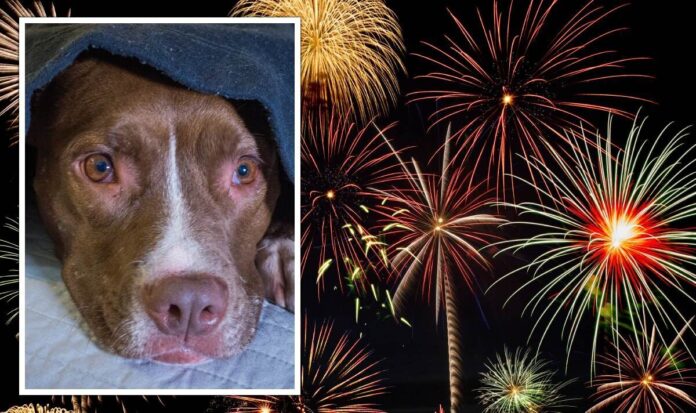It is 7pm on Friday 28th October and Henry and I are sitting under my desk, at home in Brighton.His head is buried under my arm, and he is shaking uncontrollably. He pants and stares blankly at the floor, oblivious even to an offer of his favourite treat. And so begins the annual fortnight of firework terror. Henry is, sadly, far from alone in his fear of fireworks.Across the country, as people delight in bright colours lighting up the skies, thousands of owners try to comfort their dogs, cats, horses and other companion animals who feel threatened and overwhelmed by the unpredictable booms and crackles.Studies have shown that around 45% of dogs – that’s around 5.5 million in the UK – show signs of fear when they hear fireworks. Each year tragic cases unfold in the press of animals that have fled their homes and been hit by cars. Each year we hear from devastated owners of furry companions who have literally been scared to death.Meanwhile, untold thousands of animals suffer unseen.On farms, chickens huddling together out of fear can smother one another to death. And wildlife pays a heavy price for our fascination with pyrotechnics. After bonfire night, New Year’s Eve and other celebrations, wildlife rescue and rehabilitation centres are often flooded with traumatized, injured and orphaned wild animals. In 2020, over 300,000 people signed a petition to the government urging tighter laws on firework sale and use. Since 2016, Parliament has held five debates on restricting fireworks, and each time the Government has resisted calls for stronger regulation, opting instead for research on noise levels and public awareness campaigns to promote ‘considerate’ use of fireworks. Following the example set by Australia and banning the public sale and use of fireworks would dramatically reduce stress and danger to animals. But a meaningful compromise would be to introduce a licensing requirement for firework purchases; further restrict the periods during which fireworks can be sold and used; and reduce the maximum noise level for fireworks for public sale to 90 decibels, equivalent to a lawnmower (the current limit of 120 decibels is equivalent to a jet engine).This small sacrifice on our freedom to light the rocket fuse would reduce the suffering of millions of animals each year, and prevent countless needless deaths. It’s the least we, as a nation of animal lovers, should do. Claire Bass is executive director of Humane Society International/UK.
Call for fireworks to be banned ahead of Bonfire Night to protect pets
Sourceexpress.co.uk
RELATED ARTICLES


